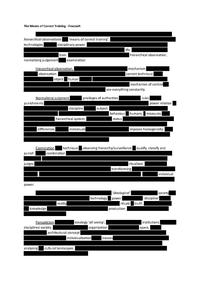Hybride Text
Hybride Notes
Hybride Text
In these two chapters from Michel Foucault’s book ‘Discipline and Punish’, Foucault writes about hierarchical observations as a ‘means of correct training’. He elaborates on the micro-physics and the technologies of a new disciplinary power. First used in the army and them applied to education, medicine, penology, architecture and every other branch in human life. The main functioning of disciplinary power is to train. The success depends on three elements: hierarchical observation, normalizing judgement, and examination. Hierarchical observation, the exercise of discipline assumes a mechanism that coerces by means of observation. From the master observing the apprentice in correct technique to the harnessing of every object of human contact. Observatories were arranged like a military camp, schools, hospitals and prisons. These disciplinary institutions created a mechanism of control, an perfect one would make it possible for a single gaze to see everything constantly.
We life in a different kind society, Deleuze calls it the ‘Societies of Control’, which are in the process of replacing the disciplinary societies. Like the environments of enclosure, each having its own laws – prisons, hospitals, school, family. They are particularly visible within the factory: to concentrate, to distribute in space, to order in time, to compose a productive force within the dimension of space-time. But what Foucault recognized as well was the transience of the model. It succeeded that of the societies of sovereignty, the goal of functions of which were something quite different. The transition took place over time.
An important aspect of the societies of control is that we are allowed to do ‘whatever we want’. It is a kind of freedom, no longer restrained by enclosure structures. This kind of freedom gives a ‘responsibility’ throughout life. Even with this kind of freedom, we know that we are being tracked.
Normalizing judgment is about privileges of authorities in laying down rules and the punishments for their infractions. These rules as we understand it today began as a power relation by people in authority creating a discipline on their subject. The authority created a power relation instead an description. This kind of punishing change the behavior of humans. It measures them and places them in a hierarchical system. The mark of your status is meaningful, you want to belong to a ‘normal’ group. Normalization makes people homogeneous, but it also makes it possible to measure differences between individuals. The power of normalization imposes homogeneity: but it individualizes by making it possible to measure gaps, to determine levels, to fix specialties and to render differences useful by fitting them one to another.
The technique of supervision grows after World War 2. The computers give a great advantage, because it provided processing and analysis of a huge amount of information in a must easier and faster way. at the same time it is also much easier to exchange information. They also connect information, so you will see relationships and patterns in an large amount of data. These new techniques of observation makes people not as individual anymore, but break into a series of discrete, measurable parts, according to previous classifications. Merges does together and you get ‘double data’, a virtual profile.
Examination is an technique of observing hierarchy/surveillance to qualify, classify and punish. It is an combination of the techniques of an observing hierarchy and those of a normalizing judgement. It establishes over individuals a visibility through which one differentiates them and judges them. In all mechanisms of discipline the examination is highly ritualized. For example in schools, examination introduced certain new features like transforming the economy by the exercise of power. Also examination gives individuality into the field of documentation. And every individual becomes a ‘case’ that can be analysed and described, it creates individuals as an effect and object of power.
The historical development of surveillance creates a better observations on peoples actions. Before people with power where seen and the ‘lower’ part was on invisible. This has change over time and the hierarchy of visibility is leveled. Because everyone is under the supervision and wants to be seen. That does not mean the social inequalities are solved. But groups in society that could go under the disciplinary power structures unseen, will live now under supervision. There is a decentralization of supervision.
Panopticism meaning the ideology ‘all seeing’, was necessary in all our institutions to create a disciplined society. Foucault concern is the organization of power in terms of space, like the Panopticon. An architectural concept by Bentham in the 18th century. The idea of a Panopticon underlines the notion of the individualization of the masses, like hospitals, school or prisons. The concept of Foucault’s Panopticon and power relations creates an interesting opportunity for analyzing the cultural landscapes. It describes the power in specific landscapes, and how power structures operate in a cultural landscape.
Like the series Black Mirror episode ‘White Bear’, where are girl is capture in a ‘show’ where everyone watches her. She has been programmed, scripted, in a manner in which she is obliged to take part in the system in her particular role. Is like the show is an Panopticon and she is the only in it.
Reference
The Means of Correct Training – Foucault
Postscript on the Societies of Control - Gilles Deleuze
Peter Weir - Truman Show 1998
Black Mirror - White bear
Black Mirror - Waldo Moment

